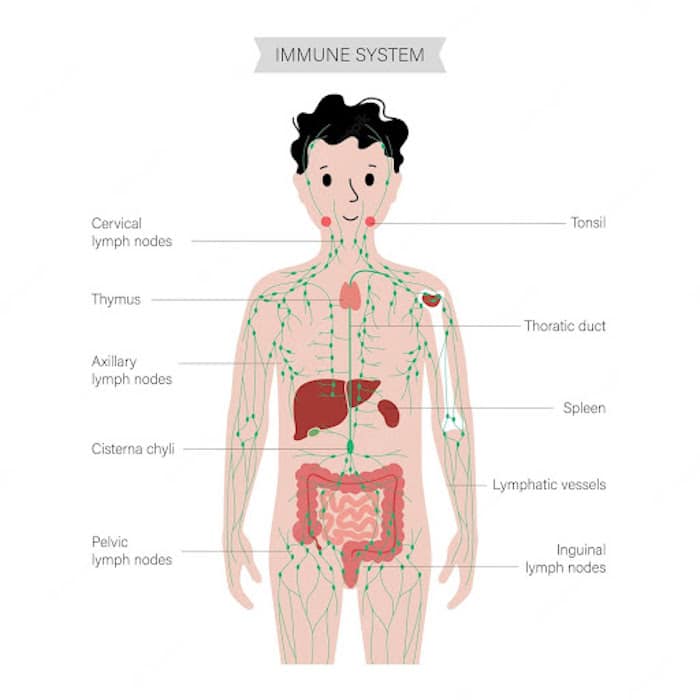Table of Contents
The lymphatic system is an essential part of the immune system, responsible for fighting infections and diseases. It is made up of a network of vessels and nodes that transport lymph, a fluid containing white blood cells, throughout the body. When the lymphatic system is compromised, it can lead to a weakened immune system, making it easier for infections and diseases to take hold. One way to boost lymphatic system immunity and functionality is through the use of quercetin, a natural flavonoid found in many fruits and vegetables.
What is quercetin?
Quercetin is a flavonoid, a type of plant pigment that gives many fruits and vegetables their vibrant colors. It is found in high concentrations in foods such as apples, onions, grapes, berries, and broccoli. Quercetin has been shown to have anti-inflammatory, antioxidant, and antiviral properties, making it a popular supplement for boosting overall health and immunity.
Understanding the lymphatic system
The lymphatic system is a complex network of vessels and nodes that runs throughout the body, parallel to the circulatory system. It is responsible for transporting lymph, a fluid that contains white blood cells, throughout the body. The lymphatic system plays a crucial role in the immune system, as it helps to identify and fight infections and diseases.
The lymphatic system is divided into two main parts: the primary lymphoid organs and the secondary lymphoid organs. The primary lymphoid organs, which include the thymus and bone marrow, are responsible for the production and maturation of immune cells. The secondary lymphoid organs, which include the lymph nodes, spleen, and tonsils, are responsible for filtering lymph and trapping foreign substances, such as bacteria and viruses.

The role of the lymphatic system in immunity
The lymphatic system is an essential part of the immune system, as it helps to identify and fight infections and diseases. When an infection or disease is present in the body, the lymphatic system responds by producing more white blood cells, such as lymphocytes and macrophages, which are responsible for attacking and destroying the foreign substance.
The lymphatic system also plays a crucial role in removing waste and toxins from the body. When lymphatic flow is compromised, it can lead to a buildup of waste products, which can weaken the immune system and lead to various health problems.
How quercetin boosts lymphatic system immunity
Quercetin has been shown to have several beneficial effects on the lymphatic system, including boosting immunity and reducing inflammation. One way that quercetin boosts lymphatic system immunity is by increasing the production of white blood cells. Studies have shown that quercetin can stimulate the production of lymphocytes and macrophages, which are responsible for attacking and destroying foreign substances.
Quercetin also has anti-inflammatory properties, which can help to reduce inflammation in the lymphatic system. Inflammation can lead to a buildup of waste products and toxins, which can weaken the immune system and lead to various health problems. By reducing inflammation, quercetin can help to improve lymphatic flow and boost overall immune system function.
Benefits of quercetin for lymphatic system functionality
In addition to boosting immunity, quercetin has several other benefits for lymphatic system functionality. One of the most significant benefits is its ability to improve lymphatic flow. Studies have shown that quercetin can help to improve the function of the lymphatic vessels, allowing for better circulation of lymph throughout the body.
Quercetin has also been shown to have antioxidant properties, which can help to protect the lymphatic system from oxidative stress. Oxidative stress can occur when there is an imbalance between free radicals and antioxidants in the body, leading to damage to cells and tissues. By neutralizing free radicals, quercetin can help to protect the lymphatic system from damage and improve overall lymphatic system function.
Quercetin-rich foods and supplements
Quercetin is found in many fruits and vegetables, making it easy to incorporate into your diet. Foods that are high in quercetin include apples, onions, grapes, berries, broccoli, and kale. Quercetin is also available in supplement form, which can be a convenient way to ensure that you are getting enough of this beneficial flavonoid.
When choosing a quercetin supplement, one like quercetin with bromelain for allergies, for instance, it is essential to look for a high-quality product from a reputable manufacturer. It is also important to follow the recommended dosage, as taking too much quercetin can lead to side effects such as headaches, nausea, and stomach upset.
Quercetin dosage and safety
The recommended dosage of quercetin varies depending on the individual and the reason for taking it. For general health and immunity, a typical dose is between 500-1000 mg per day. However, for specific conditions such as allergies or inflammation, higher doses may be necessary.
Quercetin can be found in many food sources, but the most efficient way to get a sufficient dosage for fast results is to find a good Quercetin supplement. A highly reviewed example is Quercetin with Bromelain by Eternum Labs.
Quercetin is generally considered safe when taken in the recommended dosages. However, it can interact with certain medications, such as blood thinners and antibiotics, so it is essential to talk to your doctor before taking quercetin if you are on any medications.
Other health benefits of quercetin
In addition to its benefits for the lymphatic system, quercetin has several other health benefits. It has been shown to have anti-inflammatory and antioxidant properties, making it beneficial for conditions such as arthritis, heart disease, and cancer. Quercetin has also been shown to have antiviral properties, making it useful for fighting infections such as the flu and the common cold.
Quercetin has also been shown to have benefits for brain health, as it can help to improve cognitive function and protect against age-related cognitive decline. Additionally, quercetin has been shown to have benefits for exercise performance, as it can help to reduce inflammation and improve endurance.
Quercetin research and studies
There have been many studies on the benefits of quercetin for overall health and immunity. One study published in the Journal of Nutritional Biochemistry found that quercetin supplementation increased the production of lymphocytes and macrophages in mice, leading to improved immune function.
Another study published in the Journal of Strength and Conditioning Research found that quercetin supplementation improved endurance and performance in cyclists, likely due to its anti-inflammatory properties.
Conclusion
The lymphatic system is an essential part of the immune system, responsible for fighting infections and diseases. Quercetin is a natural flavonoid found in many fruits and vegetables that has been shown to have several beneficial effects on lymphatic system immunity and functionality. By boosting immunity and reducing inflammation, quercetin can help to improve lymphatic flow and overall immune system function. Quercetin is available in supplement form, and it is also easy to incorporate into your diet through the consumption of quercetin-rich foods. Talk to your doctor before taking quercetin, particularly if you are on any medications, to ensure that it is safe for you to use
Photo by Sasun Bughdaryan on Unsplash


